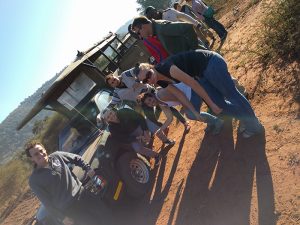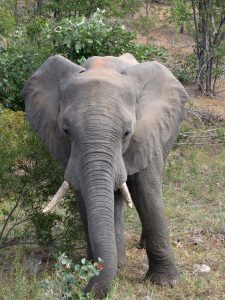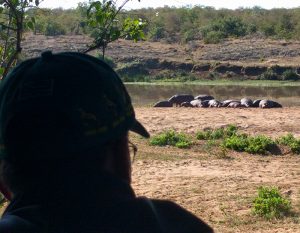
There’s more to it than meets the eye
By Randi Bromm
It has been four days since I have returned from South Africa and I must say that I still do not feel I have been able to wrap my head around everything to its entirety. The return home was a fever induced blur thanks to what can only be described as the worst flu I have ever contracted.
For the record, traveling internationally for over 24 hours while at the height of a foreign flu is easily a new kind of torture and I am simply baffled that I managed to enter and leave that continent sick. However, after four days of being bed ridden, I have begun to seriously examine where I am now. Not strictly geographically speaking that is.
I had never traveled prior to this trip. I went to Kansas for two years due to a job relocation but I would by no means call that an exotic experience nor had I ever been out of the country. I was told by a few people that I was brave for having taken on what was essentially a two week long camping excursion. Uprooting every two days to change camps, one of which was a homestay in a rural villagewithout running water, with a group of brand new people, taking place halfway around the world. It was a big chunk for an undergrad who had never left Arizona.
 It was stressful, I cannot lie about that. Not necessarily in an “I’m going to fail my test” or “How am I going to pay my bills” kind of way that I am used to during the school year. This was much more exhausting in a general physical and mental way. With new things occurring on a daily basis, there was very little time to slow down. Literally every day presented something new; another intriguing lecture, more biological phenomena, brand new animal interactions and sightings.
It was stressful, I cannot lie about that. Not necessarily in an “I’m going to fail my test” or “How am I going to pay my bills” kind of way that I am used to during the school year. This was much more exhausting in a general physical and mental way. With new things occurring on a daily basis, there was very little time to slow down. Literally every day presented something new; another intriguing lecture, more biological phenomena, brand new animal interactions and sightings.
Even on my first morning in Olifants when I opted out of an optional game drive just to steal some alone time to reflect by myself, I was instead interrupted by this noise that sounded like a sick dog. I came out of my hut to encounter a large male baboon who was the culprit, shrieking while he made his way through the camp climbing on to patios and through the streets. The guests threw rocks to dissuade him from getting too close while the locals simply minded their distance but were also unconcerned with his presence. These kinds of events, while brilliant and extraordinary, still keep the senses high as there is so much to take in and be aware of in this environment that is completely different.
 However as stressful as I found it, the trip was also fantastically enlightening as well. Our ongoing assignment throughout this trip had been to find solutions to the challenges that face the wildlife economy. We all focused particularly on poaching while in the States which was reflected heavily in our presentations. I had been especially interested in farms for animal’s resources as a possible solution.
However as stressful as I found it, the trip was also fantastically enlightening as well. Our ongoing assignment throughout this trip had been to find solutions to the challenges that face the wildlife economy. We all focused particularly on poaching while in the States which was reflected heavily in our presentations. I had been especially interested in farms for animal’s resources as a possible solution.
However during our time on the ground, we actually unraveled an interlocking web of complex components that made up a bigger picture of which poaching is only a small piece of. We learned of the complexities that surround transboundary parks, the faults in top-down management that use vaguely constructed maps to label rural ecosystem services, the in-depth conception and definition of these ecosystem services for a range of people involved in the parks, the trials and tribulations of rural villages that live along the borders of these parks.

We were given the information to understand the nature of damage causing animals, their function within a park and the danger they face as well as present and that these animals are not always those with sharp teeth but those that are large in size or population. The existence of these animals fuels the economics of the region thus the management of these animals is critical. By the end of our stay, our presentations had gone from focusing on a dwindling Rhino population in the face of poaching, to the community based involvement that is necessary to solve problems that require multipronged approaches.
Do I believe our views were influenced by those who were teaching us and their own agendas? More than likely. I’m sure there are other aspects to this problem we overlooked. What is important though, is the appreciation this trip bestowed upon me for the need for a bottom-up firsthand perspective. As students, we knew what the internet told us, which is only a click away but very segregated from the reality of the issue. On the ground, literature we had read was tossed aside, some even denounced and discredited. We saw what was actually important to those who were involved. I do not think there is danger in scaling back in wicked problems but there is in doing so for too long and especially in focusing only on that scale. You forget what is actually real. Maps, figures and literature can be great sources of information but not in lieu of on the ground observation. I thought I was going on a safari but my world was opened up to so much more. This trip has truly driven home the importance of looking beneath the surface, keeping an open mind and examining life from all possible angles.

